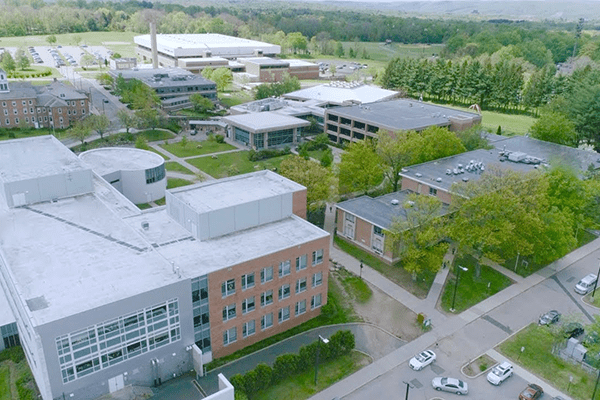|
RCBJ-Audible (Listen For Free)
|
Proposal To Close $8 Million 2024-2025 Budget Gap Calls For Furloughs, Layoffs, Spending Cuts, Tuition Increases, Sunsetting Haverstraw Campus
By Tina Traster
When tensions run high, it is not unusual for an organization to become fractious, feverish, and fraught with dissent – even when everyone involved is rooting for the same thing.
That’s precisely what’s happening at Rockland Community College, which is grappling with steep budget shortfalls, furloughs, hiring freezes, layoffs, and falling enrollment – amid a recent change of leadership.
In response to cost-cutting measures and what many say is an unwelcome change in management style, the 43-member Faculty Senate has issued a resolution calling for RCC’s Board of Trustees to remove Dr. Lester Rápalo from office as college President, alleging financial mismanagement, communication failures, and lack of leadership and professionalism on the part of the administration. Senate Faculty President Eric Magaram presented a “no-confidence” resolution, unanimously adopted by the Senate, to the Board of Trustees at their March 25 meeting at RCC’s Ellipse. The resolution calls for SUNY to appoint an interim officer to steer the college.
The Board of Trustees appears to be standing behind Rápalo, who was appointed president on July 1, 2023. But board member Grant Valentine says the trustees understand the gravity of the resolution and are taking it seriously. The board last faced a no-confidence vote 14 years ago during Cliff Wood’s tenure, but the Senate’s resolution is the harshest issued in recent memory.
“The Board is planning to have an internal discussion about the Faculty Senate Resolution,” said Valentine. “We must ensure that the faculty understands that we’re concerned, that we’re working as hard as we can, going back and forth to Albany and to the County Executive. But we’re confident that the President will get us through this.”
Valentine added that Rápalo steered his prior college through a similar crisis. Rápalo last served as provost and vice president for academic affairs at Bronx Community College, City University of New York (CUNY).
RCC, which is part of the State University of New York (SUNY) system, is facing an $8 million budget deficit, which was uncovered after a comprehensive review of the college’s fiscal state shortly after Rápalo took office, according to the college president budget proposal. In November 2023, the college’s Board of Trustees adopted a “Personnel Savings Plan,” that included nine days of furlough spread over six months for all administrators (except CSEA staffers) and termination of seven staffers to plug a $3.6 million “structural deficit” gap. However, according to the report, the Phase I budget reduction totaled only $2.165 million, a shortfall.
Now, a second action plan has been proposed and approved unanimously by the Board of Trustees. The cost-cutting plan, which includes more furloughs, layoffs, and a tuition increase, calls for reducing the 2024-2025 budget by $8 million, from $67 million to $59 million. The anticipated reduction includes personnel reductions in academic affairs (19), workforce development (2), finance and administrative services (10) and student services (4) for an estimated total of $4 million in savings. Some of these positions have been vacant or “term-limited”. The balance of the plan calls for reductions in “OTPS,” which stands for Other Than Personnel Services and Equipment Expenditures of $3 million, including the release of the off-campus location in Haverstraw, where the lease is due to expire in June. The college had been renting the facility for $180,000 a year.
Also approved are increased projected revenues by raising tuition from $228 per credit to $243 per credit. There is ongoing discussion to add a student service/academic support fee of $150 for a full-time student and $10 for part-time students. There’s also a plan to raise revenue by leasing the campus theater for an estimated $50,000 in revenue.
RCC also maintains two other extensions, both in Nyack (the RCC Culinary building) and Orangeburg. The report says the “sites are operating at a deficit due to the high rental costs and the low enrollment in the programs offered at each site.” The report further says that “no needs assessment” was conducted before choosing these locations or programming, which cost the college $1.47 million in rent last year for all three properties.
“It’s fair to say that the president didn’t start the budget woes; he inherited a mess,” said Magaram. “Everyone agrees there’s a budget crisis. We know we must right the ship. But the problem we have is that there’s a lack of communication. The president and his administration are not including us in the decision making. We don’t have a seat at the table.”
Joining Magaram in their opposition to the administration are representatives of the Student Government Association, Rockland Community College United Federation of Teachers (RCC UFT), and the Administrators and Staff Association.
The resolution accuses the administration of mismanaging the college’s finances and downplayed its own role in its financial pitfalls. The document further said the administration is causing a “deterioration of campus morale and functioning” at RCC. The resolution says cuts to faculty and staff were proposed without regard to Collective Bargaining Agreements.
The resolution highlights what it calls a breakdown in “shared governance,” citing lack of time for discussion on proposals in advance of Board workshops, seesawing on the implementation of furloughs, insufficient time to provide feedback on the 2024 Saving Plans, and failures to follow guidelines for the Reappointment, Tenure and Promotion Policy.
One faculty member, who requested anonymity, said her position was cut even though the Retention, Tenure and Promotion committee, a subcommittee of the Senate, voted 7-0 for reappointment. The teacher learned about the job cut from a Board of Trustee report.
“I never heard from anyone,” the teacher said. “A board report came out on a Friday. That’s how I found out I wasn’t being reappointed. No formal letter. Instead of being collegial and professional, or before letting the public know, this is how I learned I was losing my job.”
In response, the Senate resolution states “the appeals process for faculty not recommended for reappointment by the Senior Administration has not been followed. The way in which faculty were notified of their non-reappointment publicly through the BOT package was unprofessional, cruel and shows (both) a lack of respect and effective communication.”
The Senate’s resolution demands that the Board replace Rápalo with an Officer in Charge, to be appointed by SUNY.
RCBJ requested an interview with Rápalo but was issued a statement instead.
“I want to express my appreciation to our esteemed faculty and dedicated staff for their professionalism, resilience, and unwavering dedication to RCC students during this difficult time,” Rápalo’s statement said. “Their contributions are the backbone of our institution.”
While it seems unlikely Rápalo will be shown the door, the administration will continue to receive pressure to retool the culture to work more collaboratively with faculty and the unions. Many have spoken up about low morale, saying the anxiety and stress over livelihoods is palpable on campus. The Senate says the administration brought faculty cuts to the Board without any consultation with the faculty, staff, and student groups. Those groups are entitled to be involved in such deliberations under the Shared Governance provisions underpinning the college, they say.
“When you don’t include people affected by decision making, it destroys morale,” said Kristopher Baker, a member of the Senate’s executive committee and President of RCC Federation Teachers Local 1871. “We agree the college needs right-sizing but we don’t agree on areas that are being cut. When you cut faculty, you put the college into a spiral. We’ve lost nearly 15 percent of faculty from 2018 to 2024.”
For now, the budget remains a work in progress, according to Valentine.
“This is a work in progress,” said Valentine, who said he’s lobbying in Albany for equitable funding for SUNY Community Colleges in the State Budget for Fiscal Year 2025. “It is not written in stone. It will probably be modified but we had to start somewhere.”
Valentine also said the Board asked to see the administration’s budget plan first, before sharing it the Senate. “We made that demand to the president,” he said. “I will get called on the carpet, but we said that. And the president’s taking the heat.”














